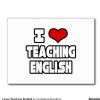|
ESL Forum:
Techniques and methods
in Language Teaching
Games, activities
and teaching ideas
Grammar and
Linguistics
Teaching material
Concerning
worksheets
Concerning
powerpoints
Concerning online
exercises
Make suggestions,
report errors
Ask for help
Message board
|
ESL forum >
Grammar and Linguistics > Doubts...
Doubts...
|

zoretta

|
Doubts...
|
|
Good Morning everybody!
I was having a private lesson last night and my student read his exercise aloud, and he said:
- Shall I turn on the light?
- No, don �t turn on the light.
On the book it said these answers are correct. However I was taught that the preposition goes at the end of the sentence:
- Shall I turn the light on?
- No, don �t turn the light on.
I know that you have a pronoun you have to split the phrasal verb (Turn it on and not Turn on it...), but what happens in this case?
Are both solutions correct?
Thank you so much for your support!
Claudia
|
3 Apr 2009
|
|
|
|

Tere-arg

|
Hi Claudia,
Both are right although it is advisable to use the object between the verb and particle if the object is composed of one to three words (short one) and if it is a pronoun, it should always follow the verb.
Turn the light on.
Turn it on.
Turn on the light.
BUT
Turn on all the front lights.
|
3 Apr 2009
|
|
|

zoretta

|
|
Thank you so much!!!!!
I was afraid I said the wrong thing to my student!
Ciao
Claudia |
3 Apr 2009
|
|
|

HARIM

|
|
Hi Zorita,
Don �t worry.In this case,both sentences are correct.But.....
There are separable verbs and particles as in Turn the light on ,Turn on the light and Turn it on which are all correct ;but Turn on it isn �t because,as Tere,stated the pronoun can �t come after the particle.
But there are unseparable verbs and particles like in the example Look after the child but not Look the child after
Have a nice weekend |
3 Apr 2009
|
|
|

zoretta

|
|
OOOOOOOOOOOOOOOOOOO yes now I remember this thing...!!!!!
Cool!
thanx a lot Harim!
good weekend to you too! :) |
3 Apr 2009
|
|
|

Logos

|
|
Phrasal Verbs are a veritible minefield for teachers who want a clear cut explanation about what is right and what is wrong. There are basically three types. Those that don �t need an object (The rocket took off.) Those which need an object but can only be placed at the end (The police are looking into the crime) and those which require an object which can be put between the verb and the preposition. (Turn on the light, Turn the light on)
As to which is which is more a matter of feeling than any particular formula. One test for the type two and three is to make the object it - thus "Turn it on" sounds okay, but "Turn on it" sounds quite strange (Though it can have another meaning)
Basically most phrasal verbs have to be acquired as a habit or by feeling rather than trying to memorise a set rule for which preposition takes the object and which doesn �t. |
3 Apr 2009
|
|
|

Tere-arg

|
I would not dare to say it is a question of feeling.
Those taking an object are called transitive and as any transitive verb they need the object to complete their meaning what does not happen with intransitive ones.
Besides, there are also phrasal verbs which are transitive some times and intransitive some others (depending on their meaning):
The plane took off (intransitive = no object is needed/possible)
but
Take your coat off.
Take off your coat.
Take it off. (transitive = object is necessary)
Have a nice day!
|
3 Apr 2009
|
|
|

wolfy

|
|
Agree with all, but you must be careful as occasionally the meaning is changed. �
|
3 Apr 2009
|
|
|

mendiv

|
In the US, it is not correct to end a sentence with a preposition, even though MANY people do. In school, we would teach the students to say, "turn on the light" or "take off your coat."
I have to chuckle a bit at saying this, however, because even the teachers know that it sounds stuffy to say, "To whom does this pencil belong?" or "That is the person for whom I was looking." I feel very British when I say these types of sentences, but they are correct. (I �m not implying that British people are stuffy- only that I think in a British accent when I am being stuffy.  ) )
However, the plane example is correct. "The plane took off," is okay because off isn �t really a preposition in this sentence.
|
3 Apr 2009
|
|
|

Zora

|
@mendiv...
Turn on is a phrasal verb the same as take off... so the logic there is a bit erroneous. "The plane took off"... is in essence the same as "the light is turned on"... the preposition can come at the end because it is part of the verb...
|
3 Apr 2009
|
|
|